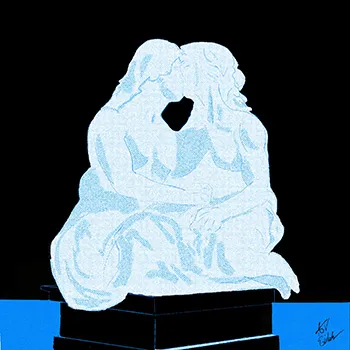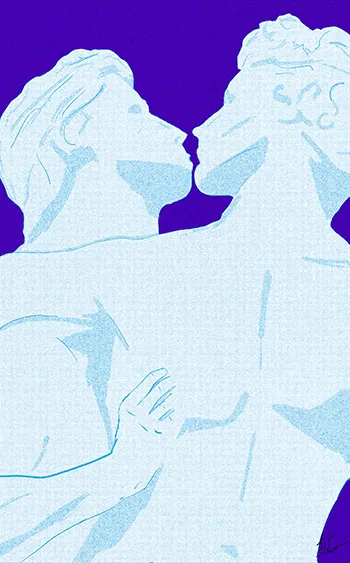I consider myself an expert in Queer love. As the resident coordinator of the weekly SGN book club, I read roughly one LGBTQ+ book a week. Over the last two years, that has amounted to nearly one hundred books, ranging from smutty romantic holiday novels to modern classic coming-of-age books. On top of reading all these stories, I also interview most of their authors. One of my favorite questions to ask them is, "What makes a Queer story different?"
It is an important question. I hear it often from heterosexual friends and family members when I tell them I review Queer books. As important as the question is, it can be hard to answer. The most common response is that Queer stories, especially Queer love stories, are not different. Like the ugly mug my mom gave me for Valentine's Day in 2021, "Love is love."
It's the simple answer. One mass-produced over the last fifty years used to convince straight people that LGBTQ+ folks deserve the same rights and opportunities because humans often fail to see the humanity in others if they can't first find similarity.
On paper, LGBTQ+ love stories aren't any different than straight ones. The desire to love and be loved, for vulnerability and acceptance transgresses sex and gender. Off paper, in real life, the experiences of LGBTQ+ people falling in and out of love vary and often differ immensely from their heterosexual counterparts.
Playing the part
For heterosexual people, the idea of a "first love" fills the mind with romance, discovering attraction, teen rebellion, and coming of age. For Queer people, first love might be fabricated, in an attempt to follow the narrative movies and books have laid out for us.
For six years, Nat thought she was in love. She started dating the perfect guy when they were sixteen. Everything about the relationship checked the right boxes. He was handsome. He was respectful. She loved spending time with him and loved that he gave her space when needed. Her boyfriend was what Disney Channel movies and her parents' stories had made her believe love should be.
Their relationship had survived high school and the first years of young adulthood. It was comfortable, and to Nat, it was good, until everything changed.
"He came out," she said. "He then proceeded to explain to me how there is no way I was straight because we never even kissed. I never even asked to." Within moments, her perfect relationship came crashing down around her, and Nat was left to reevaluate what the last six years of her life had meant.
"It took me about a week to realize he was right. I never had the slightest attraction to men," she said. Nat came out as a Lesbian, and now, at 24, she's ready to experience her first romantic love.
While it may not have been romantic or sexual, the love Nat had for her first boyfriend was sincere. They are still friends to this day.

First love
Much of the media we consume shapes the expectations we have surrounding love. While Queer romances are becoming more and more common today, most young adults grew up bombarded by heteronormative media. Some grew up like Nat, convinced they were straight because that's all they knew. Others, like Ant, realized their Queerness but felt excluded from love stories because of it.
Ant is a younger Queer person. He "grew up on the internet" outside of the US. At eighteen, he had watched as others around him fell in love but felt excluded from the experience often portrayed as a universal part of growing up. He would eventually meet his first love at a writing group.
"I reached out to him because I thought his poetry was beautiful," Ant said. The two cultivated a rich friendship out of a mutual love for the craft of poetry. Eventually, the handsome poet asked Ant to be his partner.
Like many first loves, the relationship ran its course and eventually fizzled out. Even though Ant is no longer with his poet, he will forever treasure the memories of the boy who first opened his eyes to love. "That relationship was special to me because we had a lot of fun. I'd never felt that type of connection with somebody before," he said. "Queer love is so beautiful, but it's very misunderstood and judged."
Mourning the memories you don't have
Sometimes, you meet a person and feel as if you should have known them your whole life. For many Queer people, a first love happening in their 20s feels like it should have come decades earlier. That sensation of nostalgia for a person you've only known as an adult inspired Lo to write an original poem titled "Cedar Ave."
"I love you because it's as if you've always been important to me," they wrote in a poem for the girl who made them believe in love again. Through their poem, Lo explored the memories they wished they had with their former love. Memories of childhood, awkward middle school photos, and romantic late-night drive in high school. Despite feeling like they should have known this person forever, Lo only has a handful of young adult memories and lessons learned from an admittedly dysfunctional relationship. Despite breaking up over a year ago, Lo still cherishes their love.
"I still hold her tenderly in my heart because the love I had for her was beyond anything romantic or sexual. I loved her like how one would a childhood friend they've known over half their life, and I always will."
Despite meeting as adults, in many ways Lo's ex helped them grow up and into themself. "She taught me how to be confident in my gender identity. She challenged my politics. She made me feel every part of me was seen and accepted. We spent the summer time irresponsibly crashing into each other because we were young and dumb. We burned each other badly. I miss her every day, but I wouldn't want her to come back into my life, I think."
Lo's experiences reflect one felt by many LGBTQ+ people, a longing for the love stories we were promised as children. Lo turned their pain, an ache for a memory they'll never have, into beautiful art. Even though they've moved past the relationship, they still wonder what their life might have been like if they had grown up with the same acceptance their former partner had.
"I met her in the spring, a few months after I turned 25. She's 23 and was born and raised here her entire life. She had more experience than I did. She knew her identity for a long time. I often think about how different my life would have been if we did meet as kids."

Just one kiss
Queer love can often spur feelings of intensity. Without more mainstream depictions of it, LGBTQ+ folks can often feel as if they're re-inventing love itself. When Mateo fell in love with his partner, he experienced a moment in which he felt like the entire world had shifted.
"I fell in love with my partner with one kiss," Mateo recalled. She was a year older than him. They met in college, through social justice community work. "For some reason, I felt like I needed to know her before she graduated," he said.
Sometimes the universe aligns perfectly. For Mateo, the stars aligned to ruin his partner's birthday. "Her friends canceled her party," he explained. Not wanting his crush to spend her special day alone, Mateo invited her over and threw an impromptu birthday party.
"She made a surprise dinner that made me cry [because] it was so good and familiar. I made her a vegan chocolate cake that she took home to her vegan mother," he remembered. As the party winded down, Mateo started to feel tired.
"I wanted to take a nap. She laid with me," he said. "I was too shy to kiss her, so she kissed me, and the rest is history." Since that fateful day, Mateo and his partner have graduated. They're still together, navigating life, identities, and Seattle.
Opposites attract
For some people, love nurtures growth through challenges in self-exploration. Eight months ago, Corbyn logged onto Grindr looking for a casual fling. "Initially, we just met for a hookup, but instantly I knew I wanted them to be a part of my life," he said. The date didn't end, and over half a year later, Corbyn hopes it never does.
In many ways, Corbyn and his partner couldn't be more different. "I'm a Black Trans Pansexual man, and my partner is a white Nonbinary Genderqueer Bisexual human," he said. "They're very open and Queer about their gender, whereas I am very binary in gender and fluid in my sexuality and gender expression." Despite Corbyn and their partner viewing gender and sexuality through different lenses, they work hard to communicate. Both of them use therapy as a tool to work on their different communication styles. They hope to merge their therapy journeys eventually. "They have been in therapy for many years, and so have I," Corbyn said. "We both have different communication styles and are autistic, so we're seeking a couple's therapist to help us bridge that gap and be a better team."
This isn't Corbyn's first relationship, but it is the first time he feels comfortable and healthy in his partnership. "I've been in two other long-term relationships that were also Queer but very toxic. It's so nice to have met my current partner who is so full of love, curiosity, and kindness for the world."
Queer people sometimes face slack for "U-Hauling," or moving too fast in a relationship. However, when people have spent decades discovering who they are on their own, they often know what they want in a partner. "I finally feel like I've met my soulmate," Corbyn said.
What is Queer love?
As much as I love reading about perfect fictional couples, I decided to challenge myself and seek out real Queer love stories. After speaking with members of Seattle's LGBTQ+ community, I've come to understand that not all love is the same.
What I found is that Queer romances are fundamentally different from straight ones. We are often presumed straight, raised in a world where the romances we read and watch on TV are (typically white) cis men and women. Unlike our straight peers, we are more likely to experience heartbreak before we even fall in love. To fully love someone else, we must first truly love and accept ourselves as someone different than who we were expected to be. We don't have many childhood romances. First crushes can be fabricated to appear "normal" or hidden in the pages of a locked diary. We experience that rush of a first love later in life. We run around the streets, go from bar to bar, high on the experiences we may have been denied as teenagers. For us, loving someone else can mean losing our families.
While straight people grow up with the expectation that they will eventually fall in love, "settle down," and start a family, the mechanics of such a future look different for us. Marriage has only been an option in Washington for ten years. We can't have children by chance. For us, it will take money, adoption agency home visits, and the biological parts of someone else.
Love is not the same. Love is not love. To love someone in a Queer way is to defy the expectations the world of gender binaries and heteronormativity places on us. To love someone queerly is an act of rebellion. To love someone queerly is to know you're not the main character in any Hollywood romance. Queer love is bold. Queer love is authentic. Queer love is not the same as heterosexual love, but it deserves to be celebrated, understood, and talked about just as much.


